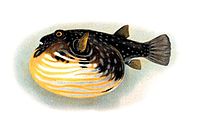
Photo from wikipedia
Na+/H+ exchangers (NHE) mediate at least part of Na+ entry into gill epithelia via Na+/NH4+ exchange. For homeostasis, Na+ entry into and exit via Na+/K+ ATPase from gill epithelia must… Click to show full abstract
Na+/H+ exchangers (NHE) mediate at least part of Na+ entry into gill epithelia via Na+/NH4+ exchange. For homeostasis, Na+ entry into and exit via Na+/K+ ATPase from gill epithelia must balance. Na+/K+ ATPase activity is reduced in cold- compared to warm-acclimated freshwater temperate fish. We hypothesized gill NHE activity is greater in warm- than cold-acclimated fish when measured at acclimation temperatures, and NHE activity displays a temperature dependence similar to Na+/K+ ATPase. Since NHE mRNA expression does not differ, we measured the Na+-dependence of pH-induced Na+ fluxes in gill vesicles from warm- and cold-acclimated fathead minnows at 20o and 7 °C, and calculated maximum transport rates (Vmax) and Na+ K1/2s. We also measured NH4+-induced Na+ fluxes and Na+-induced H+ fluxes. In vesicles from warm-acclimated fish, NHE Vmaxs were 278 ± 33 and 149 ± 23 arbitrary unit/s (au/s) and Na+ K1/2s were 12 ± 4 and 6 ± 4 mmol/l when assayed at 20o and 7 °C (p < 0.004), respectively. In vesicles from cold-acclimated fish, Vmaxs were 288 ± 35 and 141 ± 13 au/s and Na+ K1/2s 17 ± 5 and 7 ± 2 mmol/l when assayed at 20o and 7 °C (p < 0.002), respectively. Na+-induced H+ fluxes were 98 ± 8 and 104 ± 26 au/s in warm- and cold-acclimated fish assayed at 20 °C, respectively. Na+/NH4+ exchange was 120 ± 11 and 158 ± 13 au/s in warm- and cold-acclimated fish, respectively. Conclusions: Gill NHE activity was greater in warm- than cold-acclimated fish assayed at acclimation temperatures. The temperature dependence of NHE activity was similar in both groups, but differed from that reported for Na+/K+ ATPase suggesting complex mechanisms to maintain Na+ homeostasis.
Journal Title: Comparative biochemistry and physiology. Part A, Molecular & integrative physiology
Year Published: 2021
Link to full text (if available)
Share on Social Media: Sign Up to like & get
recommendations!